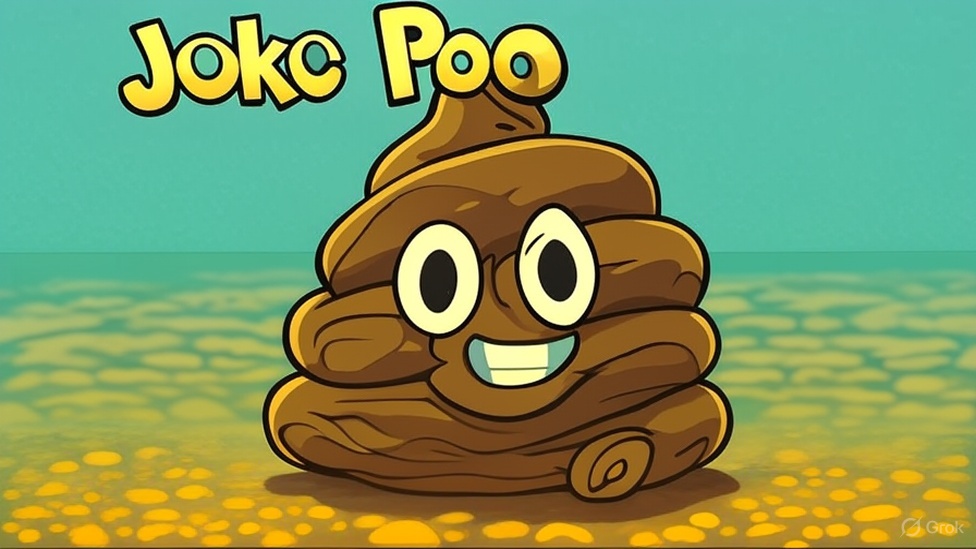Manny, are you here?
Yes poppa, I'm here.
And Frank?
Yes pop, I'm here.
Janet?
Yes Uncle Dave, I'm here.
And your children?
Yes, all here.
If you're all here, who's minding the shop?
Joke Poo: The Absent-Minded Alchemist
An old, slightly senile alchemist, Professor Fitzwilliam, hovered over his bubbling cauldron, his lab filled with pungent fumes. His apprentice, a nervous young lad named Barnaby, stood nearby.
“Barnaby, are the salamander scales prepared?” croaked Professor Fitzwilliam.
“Yes, Professor, finely ground and ready,” replied Barnaby, wringing his hands.
“And the essence of moonflower, did you distill it precisely as I instructed?”
“Indeed, Professor, following your meticulous instructions to the letter.”
“Excellent. And the tears of a laughing gnome, did you manage to procure them ethically?”
“Yes, Professor. The gnome found my juggling particularly amusing.”
“Splendid, splendid. Tell me, Barnaby… where in the cosmos is that blasted Philosopher’s Stone?”
Barnaby stammered, “Professor, you… you transmuted it just this morning. You were so proud, you took it directly to the King to present it!”
Professor Fitzwilliam’s eyes widened, “Dear heavens! Then who’s stirring the cauldron?”
Alright, let’s break down this joke and see what comedic gems we can unearth.
Joke Dissection:
- Setup: A classic deathbed scene, creating an expectation of heartfelt sentimentality and perhaps a final confession or imparting of wisdom. The use of a blind man adds a layer of vulnerability and dependence on others.
- Characters: A dying old man (Dave) and his family.
- Punchline: The seemingly inappropriate (but ultimately hilarious) question about the shop. This subverts the expected solemnity, revealing a deep-seated (and perhaps slightly obsessive) concern about his business, even in his final moments.
- Humor: The humor arises from the incongruity between the serious situation and the mundane concern. It’s a “priorities” joke, highlighting how deeply ingrained the man’s work ethic is, even at the very end. Also, there is a situational irony to the fact that the patriarch cannot see who is attending to him.
Key Elements:
- Deathbed Scene: Symbolizes finality, reflection, and the passing of legacy.
- Blindness: A physical impairment that creates dependence and vulnerability.
- Family Gathering: Creates a sense of obligation and expectation of familial support.
- The Shop: Represents the man’s livelihood, work ethic, and perhaps his primary identity.
Comedic Enrichment:
Let’s focus on the “shop” aspect and create a new joke based on an interesting fact related to business and legacy:
Did you know: The oldest family-run business in the world is said to be the Hoshi Ryokan, a hotel in Japan that has been run by the same family for over 1300 years? Imagine that family’s deathbed scene!
New Joke:
A 1300-year-old owner of the Hoshi Ryokan, surrounded by 47 generations of descendants, weakly croaks, “Is the hot spring water still at precisely 42 degrees Celsius? Did we leave out the complimentary yukata?” His great-great-great-great- (etc., 43 more “greats”)-grandson whispers, “Yes, O’ Great Ancestor, and TripAdvisor reviews are at 4.8 stars!”. The old man smiles, “Good. Now, make sure we include a special offer for first-time guests… even in the afterlife, we need to stay competitive with the other world’s inn!”
Why it Works:
- Builds upon the original joke’s theme of prioritizing business over personal matters, but magnifies it through the lens of a ridiculously long-running family enterprise.
- Introduces a factual element (the Hoshi Ryokan) to ground the humor in reality.
- The absurd number of generations amplifies the absurdity of the commitment to the business.
- Uses specific details (hot spring temperature, TripAdvisor, yukata, etc.) to add a layer of realism and comedic precision.
- The idea of staying competitive “in the afterlife” just adds another layer to the man’s dedication to his business.


